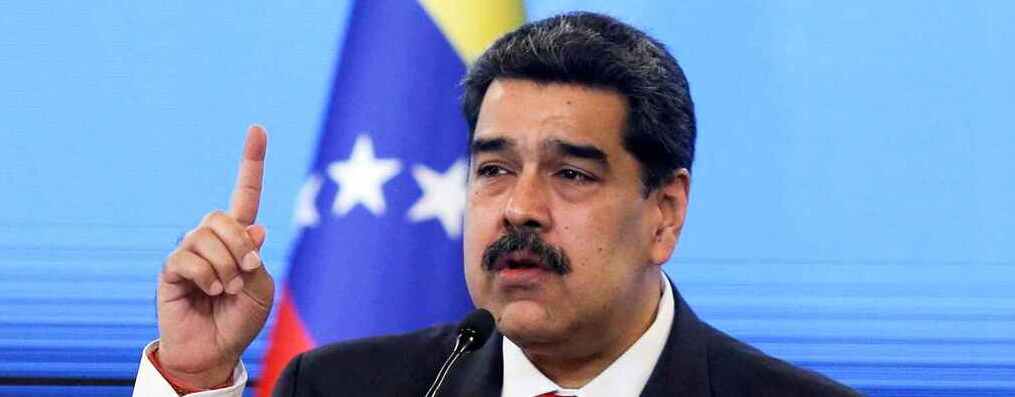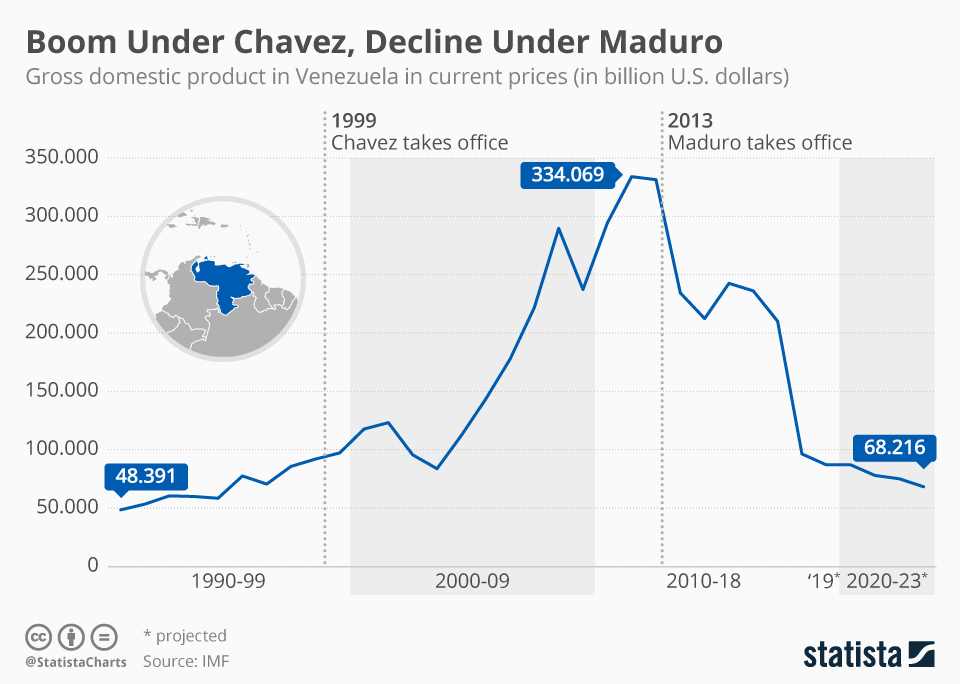The Venezuelan Dilemma
March 14, 2022 | Expert Insights

Venezuela is a sad commentary on how a once prosperous nation, generously endowed with nature’s riches, can crash into the depths as an economic basket case. The scramble for power in Venezuela has kept economics, ecology and humanitarian concerns at bay.
Background
In Venezuela, there are no easy solutions for the country’s economic woes which has been majorly dependent on oil and collapsed as global crude prices fell. Growing shortages of food and basic supplies, widespread power outages and alarming rates of malnutrition now characterize Venezuelan society. The crisis has left the country’s health care system in a sad state of repair, further challenged by the COVID-19 pandemic, which has exacerbated all of its challenges.
Faced with starvation at home, a steady exodus of locals is flooding into neighbouring countries such as Colombia, from where some move on to Ecuador, Peru and Chile and even Brazil. The United Nations estimates that more than 5.6 million Venezuelans have left the country since the crisis derailed the economic infrastructure in 2014.

Analysis
The president, Mr Maduro, is desperate for new sources of revenue. Mining promises a fresh impetus for growth and as a result, he announced that a crescent-shaped territory in southern Venezuela was open for mining. This he hopes will attract much needed investment for the extraction of gold, iron, cobalt, bauxite, tantalite, diamonds and other minerals. However, with the well-known alliance of ‘drug-traffickers, generals, gangs and Colombian guerrillas’ in the political system ready to grab the proceeds, it will be a wonder if the common citizen will benefit from it in any way.
In over two decades of power, the revolutionary socialist governments of Hugo Chávez and his chosen successor, Nicolás Maduro have led to “the systematic dismantling of Venezuela’s environmental institutions.” In what is one of the most bio-diversely rich nations in the world, the country’s leadership has deliberately turned a blind eye towards the UNESCO World Heritage Sites and the Venezuelan Amazon.
Evidence of environmental decay is evident for anyone to see. Forests are scarred with bare patches of mud and sand, evidence of the debilitating effects of illegal gold mining. Steady deforestation has taken place to make way for massive pits. According to data from Global Forest Watch, an environmental group, ‘between 2002 and 2020 Venezuela lost 533,000 hectares of humid primary forest, or around 1.4 per cent of the total humid forest area.’
Mining has a polluting impact on the local waters too. The use of mercury to separate gold from ore leads to a poisonous waste which leaches into streams and rivers. Dangerously high levels of mercury have reportedly been found in hair samples taken from indigenous people who bathe in and drink from these local streams.
In the Los Roques archipelago, home to a unique coral reef, bulldozers are diligently at work, levelling the reef for huge concrete structures to house five star hotels and mansions for the wealthy. This is in blatant violation of a 2004 decree banning construction in this ecological sensitive and rare area. The area, famed for its wildlife, including an endangered species of turtle, could be at peril with these fast paced developments.
Venezuela is home to only a modest share of the Amazon rainforest— less than 6 per cent. And yet, because of the scale of the Amazon, even that small share represents a vast swath of land. Half of Venezuela’s entire territory — almost all of the area south of the Orinoco River — is, or once was, rainforest. Until recently, this forest land had largely escaped the destruction wreaked by logging, farming and mining as it took place in parts of neighbouring Brazil and elsewhere.
But that is fast changing with the advent of mining. The OECD described mining in Venezuela as “an uncontrolled and often violent experiment in the exploitation of resources, regions and communities.” Venezuela’s environment is threatened on various fronts. While the Amazon is threatened by mining and farming, further north on Venezuela’s long Caribbean coast it is from oil.
Apparently, environmental concerns are being subsumed in the quest for quick returns. No environmental statistics have been published after 2011 so the true scale of water pollution and deforestation is anybody’s guess. The Maduro government’s indifference towards the environment was visible at COP26 climate change conference in Glasgow. While much of the world and of the Amazon nations, Brazil, Colombia, Peru, Ecuador, Guyana and Suriname signed up to the commitment to halt and reverse deforestation by 2030, Venezuela did not. Sadly, while Venezuelan politics and its virulent anti west orientation has been very much in the focus in the global media, the country’s ecological depredations have been much less well-chronicled.
To add to Venezuela’s complex struggles, the ongoing Russia – Ukraine crisis has added another layer of complexity. While he shied away from recognizing the “independent” Donetsk and Luhansk, President Nicolas Maduro spoke of increasing military cooperation and expressed full support for Russia’s stance on Ukraine. It is a hard gamble but Venezuela seems to be betting on Russia increasing its presence in the region in response to western sanctions and opposition to his regime.
Counterpoint
There are no easy answers to the ecology vs. economy debate which shows up so vividly in Venezuela. Indeed, it is on par with any developing country including India where nature’s reserves are often in a vulnerable position when economic development gains priority. In their defence, developing countries have argued that it is unfair to place the burden of environmental preservation on their already flagging shoulders, when the West has steamrolled ahead with economic progress primarily based on ecological degradation.
Assessment
- With the economy in tatters, the unstable political regime in Venezuela is looking for to save itself from drowning. Protection of the delicate ecological balance in the Amazon is not part of its immediate concern. In the economy vs. ecology battle, survival concerns are tilting the balance towards the economy.
- It is clear that saving the Amazon forests will not gain sufficient political traction in Venezuela. Given this reality, the international community and environmentalists can try to apply enough pressure to make sure that activities such as mining are carried out away from the more vulnerable eco hotspots.








Comments